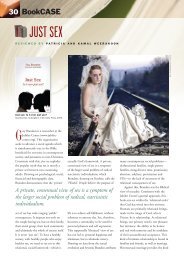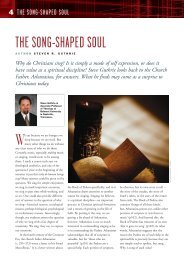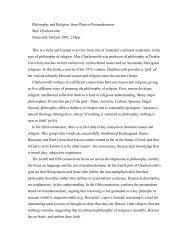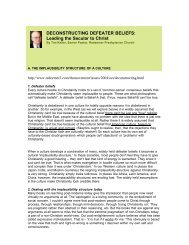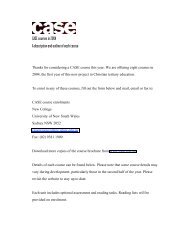The Chimpanzee Genome and the Christian View of Humanity - CASE
The Chimpanzee Genome and the Christian View of Humanity - CASE
The Chimpanzee Genome and the Christian View of Humanity - CASE
- No tags were found...
Create successful ePaper yourself
Turn your PDF publications into a flip-book with our unique Google optimized e-Paper software.
14 THE CHIMPANZEE GENOMEoccur r<strong>and</strong>omly in <strong>the</strong> genome. <strong>The</strong>y arestill at it. One in every 200 babies hasinherited a new parasitic element.One in every 1000 patients with a newlyarising genetic disease has succumbed toa misdirected parasite that has disruptedan important gene. 3Some viruses that cause cancer alsosplice <strong>the</strong>mselves at r<strong>and</strong>om sites intopeoples’ DNA. When a particular piece<strong>of</strong> viral DNA occurs at <strong>the</strong> same pointin <strong>the</strong> DNA <strong>of</strong> all <strong>the</strong> cells in a cancer,those cells are known to be descendants<strong>of</strong> <strong>the</strong> one cell in which <strong>the</strong> unique viralinsertion occurred. 4 In <strong>the</strong> same way, <strong>the</strong>presence <strong>of</strong> a particular parasitic element,inserted in <strong>the</strong> same place in <strong>the</strong> DNA<strong>of</strong> two or more species <strong>of</strong> animal, showsthat those species are descendants <strong>of</strong> <strong>the</strong>one creature in which <strong>the</strong> uniqueinsertion occurred.DNA sequencing has shown that weshare myriad individual parasitic elementswith o<strong>the</strong>r primate species such aschimps <strong>and</strong> gorillas. We are products <strong>of</strong>We <strong>and</strong> o<strong>the</strong>r primates have generatednew genes by copy-<strong>and</strong>-paste processes.<strong>The</strong>se new genes have been copied(r<strong>and</strong>omly) into our chromosomes, with<strong>the</strong> essential co-operation <strong>of</strong> enzymescontributed by parasites. 9 O<strong>the</strong>r parasiticelements that were added to primateDNA as ‘junk’ have been co-opted tocontribute to <strong>the</strong> structure <strong>of</strong> our genes. 10<strong>The</strong> study <strong>of</strong> parasitic DNA haselucidated striking aspects <strong>of</strong> our biology.<strong>The</strong>re are also fascinating implicationsfor <strong>Christian</strong> faith. <strong>The</strong> presence <strong>of</strong>shared parasites in different speciesdemonstrates that we have evolved.Religious attempts to base faith in Godby denying that evolution has occurredare untenable. Such attacks onevolutionary science are futile.<strong>The</strong> colonisation <strong>of</strong> our DNA byparasitic elements is not an integral part<strong>of</strong> our life cycle or body plan. Weconclude that r<strong>and</strong>om events havestructured our DNA. To some people,<strong>the</strong> operation <strong>of</strong> chance rules God out(‘chance’) generates novelty. <strong>The</strong> consistent,rational lawfulness <strong>of</strong> nature (‘necessity’)provides boundaries to that novelty sothat change is limited (constrained) inparticular directions. This delicatebalance between r<strong>and</strong>omness <strong>and</strong>lawfulness is consistent with a Creator’splan. Chance is an aspect <strong>of</strong> creation. 12Evolution is a wondrously fruitfulprocess that has generated <strong>the</strong> breathtakingdiversity <strong>of</strong> life because <strong>of</strong> <strong>the</strong>potentiality conferred upon it by itsCreator. Analogously, powerfulcomputer programs solve problems byr<strong>and</strong>omly generating possible solutions<strong>and</strong> <strong>the</strong>n selecting between <strong>the</strong>m. 13Fittingly, <strong>the</strong>y are called ‘geneticalgorithms’. <strong>The</strong> rationality <strong>of</strong> evolutionis consistent with <strong>the</strong> conclusion thathumanity is a purposed outcome.Of course, not everyone sees this.To one physicist (Stephen Weinberg,an a<strong>the</strong>ist), cosmic history is pointless; toano<strong>the</strong>r (John Polkinghorne, a <strong>Christian</strong>),it is rich <strong>and</strong> fruitful because <strong>the</strong>God values his creation so much that it is given<strong>the</strong> one lineage in which <strong>the</strong>se mobileelements colonised primate DNA. Ourplace in <strong>the</strong> ape family has been mappedout by investigating which species haswhich parasite. 5 Parasitic sequences are‘fingerprints’ that establish evolutionaryrelationships.It is stunning to view large segments<strong>of</strong> DNA from different species showing<strong>the</strong> same r<strong>and</strong>omly generated array <strong>of</strong>parasites. 6 Unique patterns <strong>of</strong> parasitesalso act as specific fingerprints to showhow, during primate history, largesegments <strong>of</strong> DNA have been copied-<strong>and</strong>pastedto generate complex gene families. 7Many <strong>of</strong> <strong>the</strong>se parasites have beendomesticated. Primates (including us)have co-opted genes that were originallyadded to primate DNA as part <strong>of</strong> invadingviruses. Such viral genes usually decay away,but several that entered primate DNAin distant ancestors now have a job todo in <strong>the</strong> development <strong>of</strong> <strong>the</strong> placenta. 8as <strong>the</strong> Creator <strong>of</strong> <strong>the</strong> process.Such r<strong>and</strong>omness reflects <strong>the</strong> underlyingconsistent patterns by which natureoperates. It reflects lawful behaviour. Werightly speak <strong>of</strong> <strong>the</strong> laws <strong>of</strong> probability,or <strong>the</strong> science <strong>of</strong> statistics. Probabilistic(chance) events are consistent with <strong>the</strong>law-giving rationality <strong>of</strong> <strong>the</strong> Creator.God does not control <strong>the</strong> events <strong>of</strong>nature with a vice-like grip. He is not amaster puppeteer. A clockwork universe,devoid <strong>of</strong> chance events, would be astatic structure in which nothing coulddevelop. <strong>The</strong>re could be no freedom,no newness, no novelty. God values hiscreation so much that it is given <strong>the</strong>freedom to change, to generate a history,to follow an independent course within<strong>the</strong> limits that God maintains. 11R<strong>and</strong>omness cannot <strong>the</strong>n underminefaith in God as Creator. Indeed, <strong>the</strong>re isan exquisite balance between ‘chance’<strong>and</strong> ‘necessity’ in evolution. R<strong>and</strong>omnessfaithfulness <strong>of</strong> God provides an excitingvision <strong>of</strong> hope. 14 To one French biologist(Jacques Monod, an a<strong>the</strong>ist), evolution ismerely a tale told by an idiot; to ano<strong>the</strong>r(Teilhard de Chardin, a mystic <strong>Christian</strong>),it is a gr<strong>and</strong> epic leading to anexhilarating climax. 15 To one evolutionaryscientist (Richard Dawkins, an a<strong>the</strong>ist),no intelligent person can speak <strong>of</strong> cosmicpurpose; to ano<strong>the</strong>r (Simon ConwayMorris, a <strong>Christian</strong>), it is <strong>the</strong>re for all whowill take <strong>of</strong>f <strong>the</strong>ir dark glasses. 16<strong>The</strong>re is a probabilistic texture to<strong>the</strong> world. <strong>The</strong> materialist notes thisr<strong>and</strong>omness <strong>and</strong> assumes that evolutionis meaningless. <strong>The</strong> <strong>Christian</strong> observes<strong>the</strong> same r<strong>and</strong>omness <strong>and</strong> perceives agr<strong>and</strong> design in <strong>the</strong> story. Small wonderthat modern science was incubated in a<strong>Christian</strong> environment. 17 Only people whobelieved in a faithful, good <strong>and</strong> purposivecreator God would have valued materialnature enough to probe its structure.
THE CHIMPANZEE GENOME 15<strong>The</strong> very processes that havecontributed to our evolution <strong>and</strong>provided new genes also cause diseases.<strong>The</strong> trial-<strong>and</strong>-error processes <strong>of</strong> geneticsproduce suffering. Why should Godcreate through such an insanely slow<strong>and</strong> brutal process as evolution?<strong>The</strong> scientist Peter Medawar said thatsuch questions are those that childrenask. 18 This does not mean that suchquestions are juvenile or trivial. Ra<strong>the</strong>r,<strong>the</strong>y address ultimate issues that cannotbe answered by science. <strong>The</strong>y presupposethat we need to address a person forpersonal answers. But <strong>of</strong> course wecannot interrogate God as we would like.We can make <strong>the</strong> general observationthat anything <strong>of</strong> value is achievedthrough travail. Running a race, climbinga mountain, passing an exam, or creatinga spectacularly complex, fertile <strong>and</strong>beautiful biosphere all dem<strong>and</strong> time <strong>and</strong>pain. At <strong>the</strong> heart <strong>of</strong> <strong>the</strong> Bible story is<strong>the</strong> conviction that God has paid dearlyfor his commitment to his creation.<strong>The</strong> <strong>Christian</strong> physical scientist C.A.Coulson observed <strong>the</strong> suffering in nature.He concluded that all <strong>of</strong> nature isobedient to <strong>the</strong> supreme law <strong>of</strong> sacrifice.<strong>The</strong> spectacular diversity <strong>of</strong> life couldonly come about at <strong>the</strong> cost <strong>of</strong> ongoingdeath. This law <strong>of</strong> sacrifice—life fromdeath—seems to be embedded in <strong>the</strong>deep structure <strong>of</strong> reality.At <strong>the</strong> start <strong>of</strong> <strong>the</strong> <strong>Christian</strong> faith is<strong>the</strong> suffering <strong>of</strong> a gory Roman gibbet.God himself in a person called Jesus <strong>of</strong>Nazareth experienced utter ab<strong>and</strong>onmenton a cross so that he could renew creation<strong>and</strong> reconcile humanity to himself. <strong>The</strong>death <strong>of</strong> Jesus is <strong>the</strong> chief exemplification<strong>of</strong> <strong>the</strong> sacrificial law <strong>of</strong> <strong>the</strong> universe, <strong>the</strong>time when God entered creation toremove evil <strong>and</strong> its attendant sufferingby <strong>the</strong> sacrifice <strong>of</strong> himself. 19A young medical geneticist calledFrancis Collins turned from a<strong>the</strong>ism tocommitment to Jesus Christ as he saw<strong>the</strong> faith <strong>of</strong> his patients in <strong>the</strong> face <strong>of</strong>suffering. Now as <strong>the</strong> Director <strong>of</strong> <strong>the</strong>human genome project, he sees in <strong>the</strong>human genome, parasites <strong>and</strong> all, <strong>the</strong>work <strong>of</strong> God. 20<strong>The</strong> primate geneticist AchillesDugaiczyk has surveyed <strong>the</strong> myriadr<strong>and</strong>om events by which geneticparasites have colonised our genome.He concludes that evolution may bebased on <strong>the</strong> repeatable, “but it is alsobased on <strong>the</strong> unique, which is at <strong>the</strong>outer edge <strong>of</strong> science”. 21Unique events in our genetic historyhave made us what we are now. A pattern<strong>of</strong> unique events in <strong>the</strong> r<strong>and</strong>om confusion<strong>of</strong> human history—God appearingamong us as a peasant carpenter who diedon a cross <strong>and</strong>, according to eyewitnesses,returned to life—seems totally consistentwith this view <strong>of</strong> reality. Our genetic,biological history is necessary but notsufficient to describe our humanity. Weare social, relational creatures. God hasinvolved himself personally in history,<strong>and</strong> has shared our suffering that hemight redeem <strong>and</strong> transform us.<strong>the</strong> freedom to change, to generate a history.RESPONSESCase asked some local scientists <strong>and</strong> <strong>the</strong>ologians for <strong>the</strong>ir initial responses to this article <strong>and</strong> <strong>the</strong> genome research. Please addyour thought to <strong>the</strong> discussion by emailing case@newcollege.unsw.edu.au.Peter BarryEmeritus Pr<strong>of</strong>essor <strong>of</strong> Medical Science,University <strong>of</strong> New South Wales, SydneyI think that this is an important <strong>and</strong>excellent article <strong>and</strong> that <strong>the</strong> <strong>Christian</strong>church has to face up to what ishappening in genetics research. As<strong>Christian</strong>s we should have nothing t<strong>of</strong>ear from a search for truth.Barry NewmanLecturer in Science Education (retired),University <strong>of</strong> New South Wales, Sydney.<strong>The</strong> article is too assertive for my liking<strong>and</strong> should have used words such as“strongly suggests” ra<strong>the</strong>r than “proves”.<strong>The</strong>re is a character to <strong>the</strong> article whichsuggests “truth by assertion”. It is notwritten by <strong>the</strong>ologians <strong>and</strong> thisunfortunately manifests itself at certainpoints. <strong>The</strong>re is a tendency to letevolutionary <strong>the</strong>ory lead <strong>the</strong> way<strong>the</strong>ologically <strong>and</strong> so <strong>the</strong>re are distortions<strong>of</strong> <strong>the</strong> nature <strong>of</strong> God.None<strong>the</strong>less, <strong>the</strong> matter needs to bebrought out into <strong>the</strong> open. We can onlyhelp one ano<strong>the</strong>r by having <strong>the</strong> mattersdealt with openly with various reactions<strong>and</strong> debate. Matters such asr<strong>and</strong>omness/ chance/probability <strong>and</strong> <strong>the</strong>sovereignty <strong>of</strong> God have probably notbeen addressed as well as <strong>the</strong>y might be<strong>and</strong> <strong>the</strong> article might promote somedecent thinking in <strong>the</strong> area.Evangelicals need to push for betterunderst<strong>and</strong>ing <strong>of</strong> <strong>the</strong> biblical material.In <strong>the</strong> end, it is not evolutionary <strong>the</strong>orythat is at issue but how to properlyh<strong>and</strong>le <strong>the</strong> biblical text. No one is wellserved if we continue to hide a betterunderst<strong>and</strong>ing <strong>of</strong> Genesis 1-11 fromo<strong>the</strong>rs out <strong>of</strong> consideration for <strong>the</strong>irfeelings or beliefs.Andrew SloaneLecturer in Old Testament <strong>and</strong> <strong>Christian</strong>Thought, Morling College, Sydney.<strong>The</strong> issue <strong>of</strong> biological evolution <strong>and</strong> itsrelation to <strong>Christian</strong> belief in God ascreator just won’t seem to go away. <strong>The</strong>views expressed in this paper will disturb<strong>and</strong> anger some within <strong>the</strong> Church;o<strong>the</strong>rs will be unfazed. As someone withan interest in <strong>the</strong> intersections between



